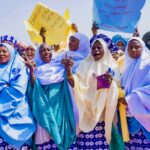Cyriacus Nnaji
AS efforts are being made globally to ensure a safer reproductive health system, a Non-Governmental Organisation, Initiative to Resist Institutional Slavery and Exploitation (IRISE) has convened a stakeholders’ meeting to find solution to unsafe abortion practices which are destroying not just the youth but also women of reproductive age.
This much was revealed at a stakeholders’ meeting convened by IRISE on 23th of November, 2024, at Perfecto La Villa Hotel and Suites, at Amuwo-Odofin, Lagos State.
Leading to the meeting was a survey conducted in October, 2024 aimed to understand community specific factors affecting Sexual Reproductive Health Rights (SRHR) and the impact of unsafe abortion practices in Oshodi-Isolo.
According Charles Christopher, A Reproductive Health expert, speaking on current situation in the community interviewed disclosed that 70% of community members are aware of pregnancy termination, but only 45% know about safe medical options; 80% acknowledge health risks of unsafe practices, while 50% cite financial barriers to accessing proper care.
Speaking on Information Gap he stated that only 40% have received formal health education from qualified professionals, 85% express strong interest in receiving more health information. He also maintained that there is a limited awareness of available local services.
He said some common unsafe practices , according to the findings include Local herbs 60%, unregistered pills 45%, unlicensed providers 20%.
Common risks identified in the survey include Severe bleeding 55%; infections 50%; long term health complications 45% and Fatal outcomes 65%.
Impact, 50% knew of at least one person who died from complications of unsafe unsafe abortion.
He disclosed that some Social factors militating against safe abortion include Stigmatization, cultural and religious considerations, need for male involvement in health decisions, economic barriers affecting access to services, information accessibility challenges, legal misunderstandings.
Omodele Ibitoye Ejeh, Executive Director of IRISE, speaking her group’s advocacy spoke about strategies, promotion of SRHR education and end unsafe abortion in Oshodi–Isolo by providing safer options.
Some of the Advocacy goals include improving awareness and understanding of SRHR, Reduce stigma and misconceptions around safe abortion and increase access to safe abortion and SRHR resources through local partnership.
She added that part of the support system envisaged include women’s support networks, healthcare provider partnerships, community leader engagement and economic accessibility solutions.
For ARISE the findings revealed significant gaps in SRHR knowledge and access, exacerbated by stigma and socio-economic barriers. SRHR’s advocacy aims to address these through community engagements and improved access to services. “We invite stakeholders to collaborate IRISE in implementing these initiatives and ensuring safer reproductive health practices in Oshodi-Isolo.
Omodele Ibitoye Ejeh said the need for stakeholders engagement in advancing sexual reproductive health of women and girls in communities is very important because women can’t do it alone. “We actually need a support system that is not just among women themselves, but between the communities. The stakeholders are in the community, they hold the community, and if the stakeholders are involved in protection of women and girls, if they are involved in making sure that women and girls have access to safe services and there are policies that can protect women and girls, I think the journey would be easier.
“So it is not a do alone thing for women and girls, it is important for stakeholders and community members especially the men allies to actually have a hand in protecting women and girls,” Ejeh said.
She also spoke on the choice of Okota for the stakeholders’ engagement. “We actually looked out for communities where we have high rate of lack of education around sexual reproductive health and right, and we carried out surveys and our findings are that it was much high in places like Okota and Ajeromi Ifelodun. So these are the places we carried out this survey, we are really focusing on Oshodi-Isolo right now, and we hope to actually expand the scope of our work. With this engagement a lot can be done, churches, mosques, communities at large, we health workers have a lot to do also.”
Mrs Said Shoeto, a Nurse and Health Worker, decried the level of decadence prevalent in the state as children of about 16, 17 coming to seek abortion services. She said the girl-child fall into wrong hands because of peer pressure and economic difficulty. “They are very small of age and even experience they don’t have it, but they fall into the wrong hand, just because of peer pressure, economic hardship and lack of parental care. If we the parents can even provide at home it could ease a little. The girls are still with their parents, even the guys that impregnate them are still with their parents. I asked, where are the mothers when you people are committing all these sex you say you are having?



